NYFF Headliners Feel Underwhelming
I was scratching my head this morning about three big New York Film festival picks that have recently been announced — Ava Duvernay‘s The 13th to open, Mike Mills‘ 20th Century Women as the centerpiece, and now James Gray‘s The Lost City of Z to close.
My honest gut reaction was “these films don’t seem to radiate the upscale pot-stirring pedigree that NYFF selections have in the past. So what’s going on here?”

Ever since the 2010 NYFF launched with The Social Network people like me have been looking to NYFF films to provoke, get people talking and occasionally figure in awards-season discussions.
I’m sorry but The 13th, 20th Century Women (which I’ve heard stuff about) and The Lost City of Z just don’t strike me as rock ‘n’ roll. They certainly don’t match anyone’s concept of upscale, dweeb-curated, Amy Taubin or Dennis Lim-approved, possible-award-conversation-level movies that the NYFF has tended to favor in the past.
They seem to me like the kind of films that respectable second-tier festivals (Seattle, Savannah, Key Key West) would highlight and make a big hoo-hah about.
Rotten Tomatoes Refusing To (a) Alter Suicide Squad’s Crummy Aggregate Rating, Or (b) Shut Itself Down
The 14,000 Suicide Squad fans who want Rotten Tomatoes shut down because of the 32% and plummeting grade given to David Ayer’s film…well, forget it. They’re going to have to take it and like it. In fact I feel like grabbing those 14,000 fans by the shirt collar and bitch-slapping them for the fun of it. Suicide Squad is expected to make…what, $140 million this weekend? Expect a pushback from the loyalists. “Much better than those nasty critics are saying!” and so on.
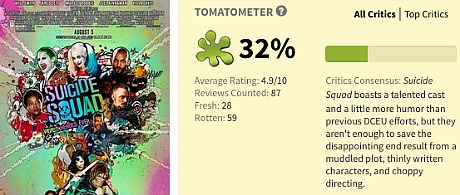
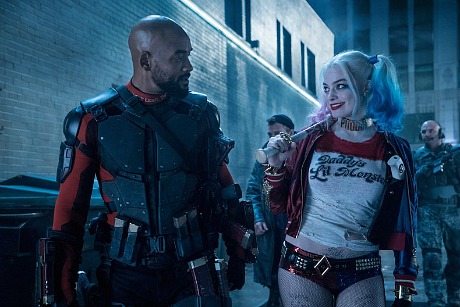

I saw Suicide Squad last night at the Grove, but I refuse to “review” it. Movies of this nature only warrant riffs, and I’m being generous in saying that.
And yet I must admit I was mildly into it for about 40 or 45 minutes, give or take. This reasonably spritzy section is mainly about (a) a nifty opening-titles sequence, (b) semi-humorous character introduction and (c) plot set-up, and all through it I didn’t once look at my watch. Then the standard D.C. conflict crap kicked in and my brain melted into a mush of oversteamed noodles spiked with hot sauce. I looked at my watch about six or seven times starting at the 45 minute-mark. I moaned, I groaned, I shed tears of pique. I told myself “stick it out, don’t leave, hang in there.” But the process of soul-poisoning had begun and I began to feel sicker and sicker as the minutes wore on.
This Old Chestnut?
It was announced yesterday that Benedict Cumberbatch intends to star in an adaptation of Geoffrey Household‘s “Rogue Male” (published in 1939). A simpler way of putting it is that Cumberbatch intends to play the great grandson of Cpt. Alan Thorndike (Walter Pidgeon) in a remake of Fritz Lang‘s Man Hunt (’41).
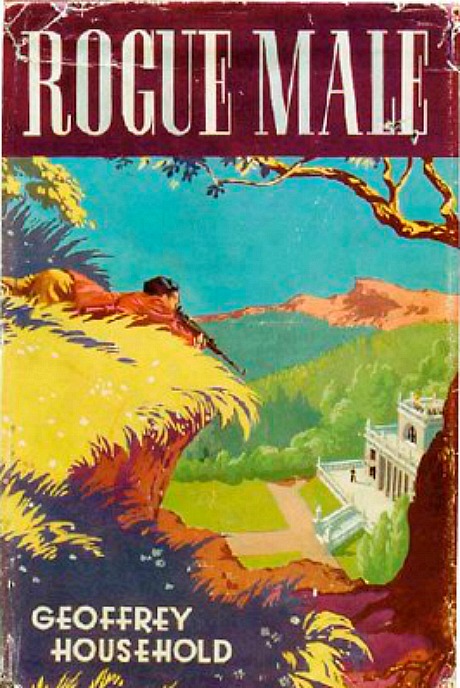
I like the idea personally but it sounds like an HBO or Netflix movie, at best.
If it’s theatrical do Cumberbatch and his producing pallies really intend to stick to the Household plot? Because 95% of the 21st Century audience would probably feel it’s too old-world, too slow and solitary, too lean and not crazy-GG enough. The only way to make it even half-palatable to today’s audience is to (a) set it in the present and (b) make the target of Thorndike’s stalking game not Adolf Hitler but Abu Bakr al-Baghdadi, the leader of ISIS. If they did that, maybe.
No Hugs, Sorrows, Laments — I Prefer Jerry the Flinty Prick
What I’d really like to see is a story of 90-year-old Jerry Langford, the late-night talk show star who was kidnapped by Rupert Pupkin back in the early ’80s. Jerry is semi-retired but still plugging away, involved in real estate and other ventures, still playing golf, still on the cryptic and blunt side, still disdainful when the occasion requires and is no one’s idea of a gentle or lovable fellow. And yet he’s largely unbent and, for an old guy, still full of beans. And he’s nice with kids and dogs.
Does “mean” Mr. Langford feel badly about still being flinty and not all that considerate with each and every person he deals with? Okay, maybe, but he’s ecstatic about the fact that he’s alive and crackling and living a pretty good life for a guy born in 1926. He’s on Twitter and Facebook and owns over 300 Blurays. And he has a 79 year-old girlfriend that he “puts it to” every so often (i.e., extra-strength Cialis), and he rides a bicycle and walks two or three miles every day and lifts weights. Who needs love, kindness and forgiveness when you’ve got your health? Langford pushes on! But watch out when he’s in a bad mood.
Wrench Me, Squeeze It Out
All Vanity Fair cover stories are blather, but if you read them carefully you can sometimes find a line or two that hints at the truth of things. Case in point: Evgenia Peretz‘s profile of The Light Between Oceans costar Alicia Vikander. Peretz describes Derek Cianfrance’s film (Disney, 9.2) as “the kind of wrenching adult melodrama that Hollywood rarely makes these days, because it’s hard to pull off successfully — although they got this one right.”
Let’s imagine for the sake of argument or hypothesis that they didn’t “get this one right.” That the film underwhelms on this or that level. If so, would there be any chance in hell that Peretz or Vanity Fair would indicate this?

What unsuccessful “wrenching adult melodramas,” I wonder, did Peretz have in mind? Which ones have worked and which haven’t? A more thoughtful writer would have explored this sub-topic to some extent, at least, but that’s not Peretz’s job. She’s on hand to fawn, to spin, to convey glamor and fascination.
Peretz later states that there was “no room for restraint” in the making of Oceans, which is “based on a full-on weepie best-seller” by M. L. Stedman. She reports that the book had director Derek Cianfrance “crying on the C train in Brooklyn when he finished it.”
Seriously? Cianfrance told her that he wept on the C train? This in itself is cause for concern.
If The Score Is Right, A Film is Halfway There
The “bad” Ben-Hur (Paramount, 8.19) had its world premiere last night (8.1) inside the Cinepolis JK in Sao Paulo, Brazil. Not Rio de Janeiro, where the 2016 Olympics will begin on Friday, 8.5 and where thousands of major-media types are congregated, but in corporate Sao Paulo. (Why?) I can’t find any Twitter reactions to Timur Bekmambetov‘s Christian-angled remake, but one can at least compared the musical scores between the two films to get a sense of things.
Miklos Rosza composed the Oscar-winning score to William Wyler’s 1959 film. To my ears Rosza’s music was a character, a voice, a force unto itself. The newbie’s score, obviously a lesser thing, was written by Marco Beltrami (3:10 to Yuma, The Hurt Locker, Hellboy, The Wolverine).
Above is a passage from Beltrami’s Ben-Hur channellings — a mildly dreamy, keyboard-synth thing. The main-title section of Rosza’s score, performed in 2013 by the John Wilson Orchestra inside London’s Royal Albert Hall, is below. A second Rosza composition (“Parade of the Charioteers”, performed by an all-brass band conducted by André Rieu) is after the jump, followed by a special Ben-Hur related performance of “Ceasefire,” performed by For King & Country, a Christian pop duo composed of Australian-American brothers Joel and Luke Smallbone. Please compare and assess.
Has Suicide Squad’s David Ayer Submitted to Realm/Scheme of Dreaded Zack Snyder?
How do you feel about revisiting Zack Snyder‘s Sucker Punch? Tonight the second-tier, all-media crowd (i.e., people like myself) will face up to the reality of Suicide Squad at screenings on both coasts. I’m a man, I can take it, I can handle anything they throw at me, bring it on! And yet I feel as if I’m about to go to the dentist. Especially after reading Peter Debruge‘s Variety review, which warns of a Snyder-type experience in more ways than one…good God:
Excerpt #1: “Suicide Squad plunges audiences right back into the coal-black world of Batman v Superman: Dawn of Justice…for reasons beyond Ayer’s control, he’s beholden to the corporate vision of other recent DC adaptations, most notably Zack Snyder’s sleek-surfaced and oppressively self-serious riffs on the Superman legend. [and is] ultimately forced to conform to Snyder’s style, to the extent that Suicide Squad ends up feeling more like [Snyder’s] gonzo effects-saturated Sucker Punch.”
Excerpt #2: “[While Ayer] and Jared Leto manage to invent a version of the Joker every bit as unsettling as the late Heath Ledger’s immortal incarnation, turning the iconic Batman rival into a ruthless seducer (hunt down ‘Mr. Nobody’ to see the origins of Leto’s wicked deep-throated cackle), the character barely has anything to do. [For] the Joker exists only to inspire his deranged arm candy, Harley Quinn.”
Hello, Monsters…Back For More
On display at the just-opened LACMA exhibit “Guillermo del Toro: At Home With Monsters” (8.1 thru 11.26) are dozens upon dozens of props, busts, full-size models, paintings and other recreations and knick-knacks from Del Toro‘s 23 years of filmmaking — i.e, Cronos to Crimson Peak. But I have a soft spot for the recreations of ’30s black-and-white monsters and especially Boris Karloff‘s Frankenstein monster…sorry. Yes, I dropped by late this afternoon. The exhibit walls are the exact same color (dark earthy red mixed with terra cotta) as those at the original Bleak house in Thousand Oaks. These creations are the purest and most vivid realization of GDT’s art, even more so than the content of his films. The acute detail in each artifact pulses and throbs. Each one has a soul, a history, a completeness.
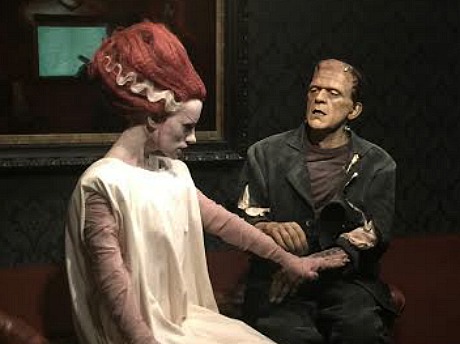
I always thought Elsa Lanchester’s hair in The Bride of Frankenstein was grayish with silver-white streaks, but it’s exciting to imagine it as flaming red, even if it wasn’t.
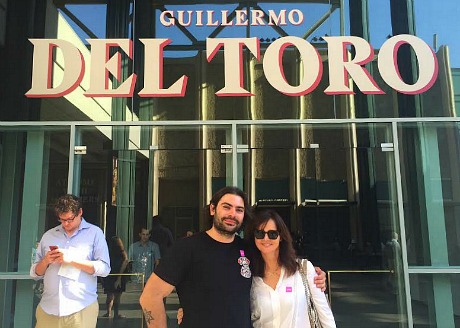
Outside main entrance to LACMA’s Guillermo del Toro: At Home With Monsters exhibit, Moscow-based director Nick Sarkisov, HE’s own Svetlana Cvetko.
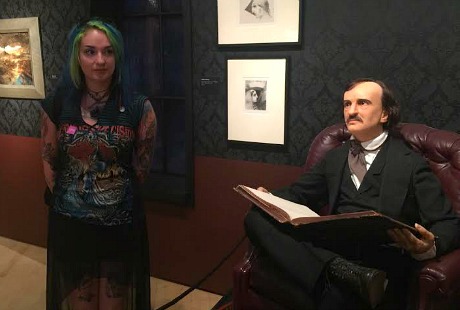
Immaculate tattoo goth girl, Edgar Allen Poe.

BFCA’s Doc Awards
Speaking as a member of the Broadcast Films Critics Association, the just-announced fact that the Critics’ Choice Awards (i.e., synonymous with the BFCA) is launching a documentary awards show next November seems like an excellent thing. Docs need all the hoo-hah they can get, and this will hopefully influence awards-think on the part of the Golden Globes, the guilds and Oscars. Nominees will be announced on 10.10; the award show itself will be staged and aired on 11.3 at BRIC in Brooklyn. What I haven’t been able to ascertain since this announcement came through last night is what the BRIC acronym stands for. BRIC is a nonprofit arts and media organization located near BAM. Founded in 1979, the original name was “Fund for the Borough of Brooklyn” but that no longer applies.
And Speaking of Viva Zapata…
Many years ago Guillermo del Toro told me he disapproved of Elia Kazan‘s Viva Zapata because it was an inauthentic, American-ized take on Mexican history, and that the life of Emiliano Zapata could and should be captured by a Mexican filmmaker or at least someone with a closer perspective than a New York Greek-American like Kazan. Agreed, sympathized with, no dispute. I’d like to see that Mexican-made version some day. But the look on Marlon Brando‘s face at the very end of this scene, a look of not just impudence but balls and confidence, is about as good as non-verbal acting gets. Moments like this are why I swear by Kazan’s film, why I’ve watched it over and over, why I own the Bluray.
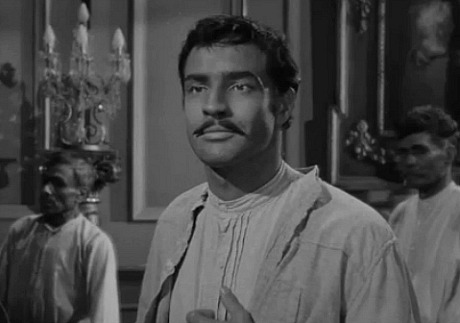
For whatever reason the TCM embed code isn’t working so I’ve posted a screen grab. Watch the clip via this URL.
The Revenant, The Bear, Grizzly Man…Which Contains Strongest Echo of This Recent Incident?
On 7.30 Mammoth Lakes resident Rodney Ginn posted a video of a momma bear and a cub invading his home. Esquire‘s Matt Miller posted a riff about it this morning, but he didn’t mention the sound that comes out of Ginn — a fluttery, falsetto shriek — when he sees the bears coming up the stairs. Listen to him…”whoaaaaa…whoo-whoo!” It reminds me of the sound that Harold Gordon makes in Viva Zapata when his character, Francisco Indalecio Madero, is about to be shot by the military.
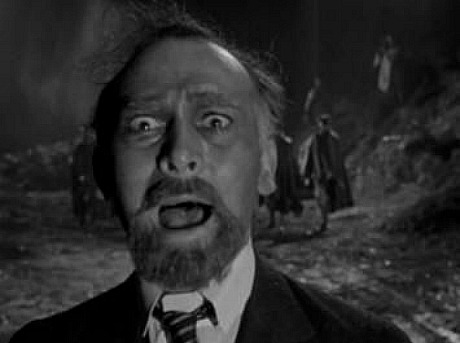
Harold Gordon’s screaming realization that he’s about to be shot in Elia Kazan‘s Viva Zapata.

